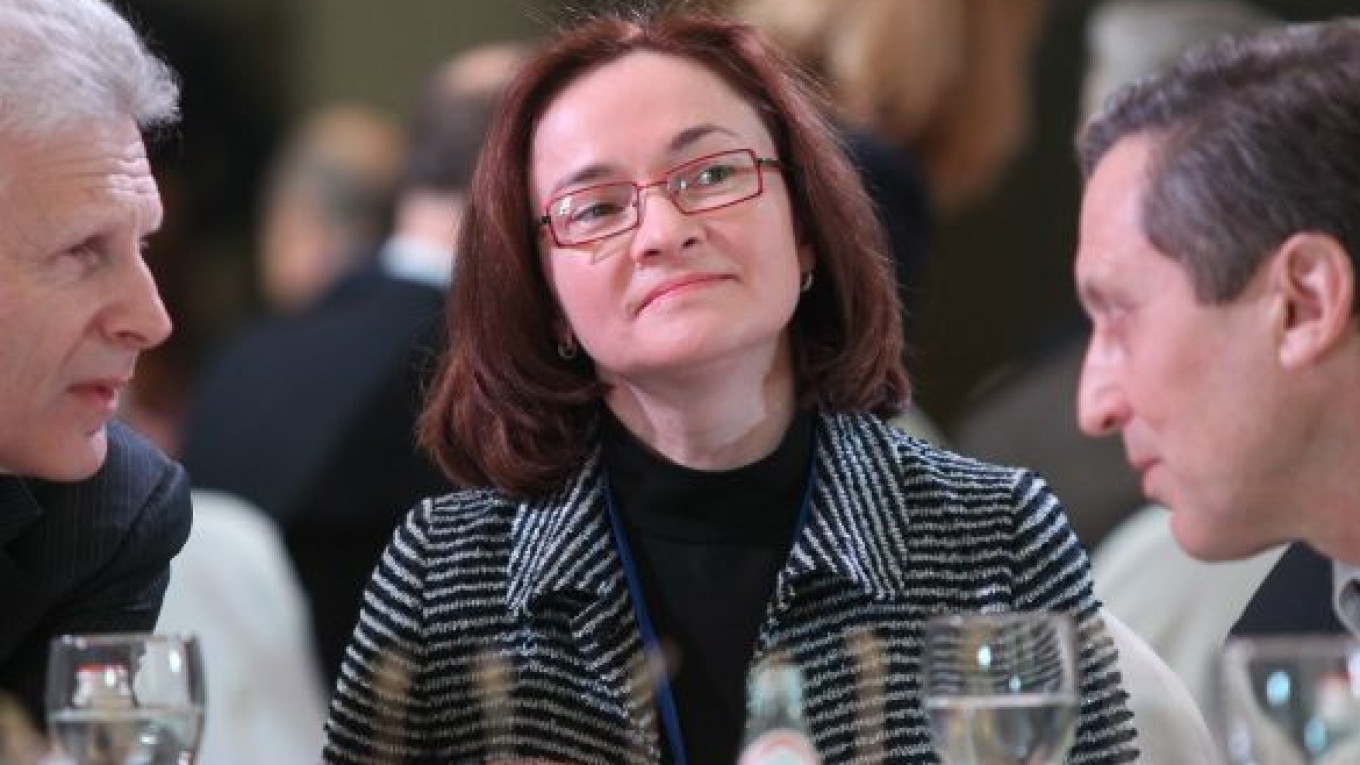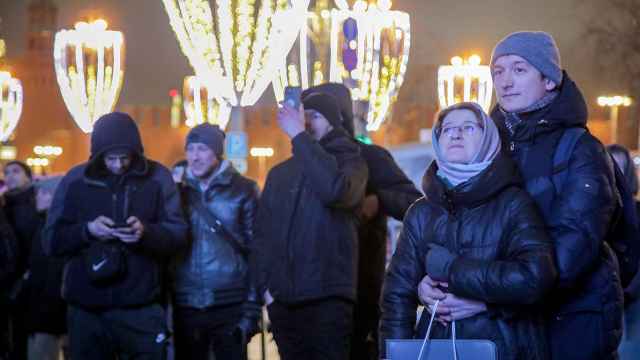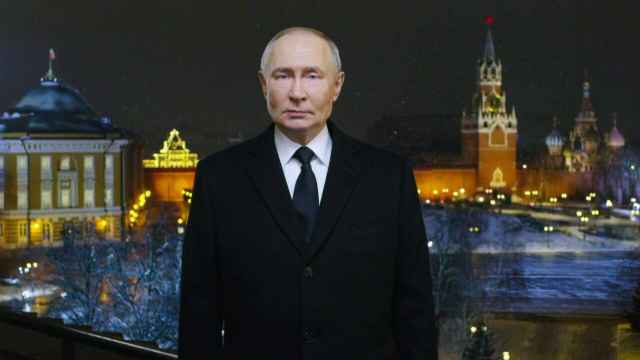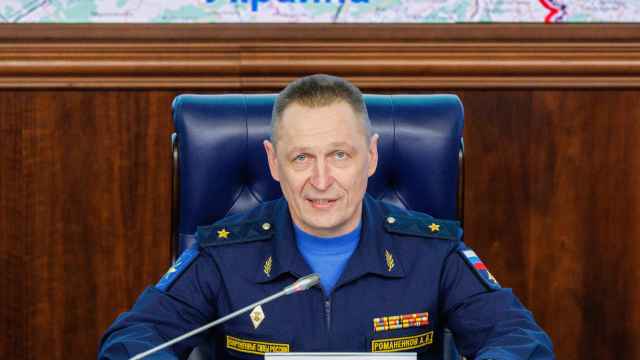When a minister abruptly proposed an inflationary change to the budget at a recent government meeting, the television cameras switched to the new Central Bank head, her face tightening.
The sharp reaction of the normally poised Elvira Nabiullina shows there is still a lot to learn about the 49-year-old economist, whom many had expected to succumb to pressure to loosen monetary policy and aid stalling growth.
Instead, the protege of President Vladimir Putin has in her first three months in office sought to establish herself as a credible inflation fighter and a more technocratic reincarnation of her bluff predecessor Sergei Ignatyev.
"Many are surprised by how independent she seems to be," said one government official who requested anonymity. "But some are saying that, perhaps, she is doing exactly what the Kremlin wants her to do."
The Russian economy, the world's eighth largest, has slowed, forcing the government to slash its 2013 growth forecast to 1.8 percent.
Yet expectations have been dashed that Nabiullina would bow to calls from powerful industrialists and the pro-growth economic development ministry to enact a round of interest rate cuts to revive growth.
Those with inside knowledge are not surprised.
"Easing? Well, no," Finance Minister Anton Siluanov said in a recent interview. "Policy will be the same as under the previous leadership, with of course, some nuances."
Nabiullina even resorted to a threat to tighten monetary policy to secure a government commitment to cap utility price hikes, winning a row with Economic Development Minister Alexei Ulyukayev, a former Central Banker, passed over for the job she got.
At the most recent Central Bank policy meeting she sounded sterner than ever in defending the bank's fight against inflation, which at 6.1 percent remains above the 5 to 6 percent target.
"To support economic growth, we need to lower inflation. This is our main goal," Nabiullina said. "Let me say it again: monetary stimulus would not be effective in our view."
Such briefings mark a departure for the Central Bank, which until a few years ago did not even disclose the dates of its meetings. Nabiullina's comments show her in tune with the concerns of ordinary Russians — and Putin voters.
According to surveys by the Levada Center, a respected opinion research group, at least two-thirds of Russians consider inflation as the country's most pressing economic problem. The second worry — poverty — comes a distant second.
To Listen and to Hear
Konstantin Sonin, a professor at the Higher School of Economics, which is headed by Nabiullina's husband Yaroslav Kuzminov, calls expectations of quick monetary easing "incompetent dreams".
Sonin doubts that there will be much meddling by the Kremlin in policymaking at the Central Bank.
"The whole experience of Putin's rule shows that when it comes to macroeconomic policies, he trusts his advisers very much," he said. "In fact, he has protected them from political pressure."
Artyom Konstandyan, chief executive of Promsvyazbank, acknowledged Nabiullina's independence but had greater appreciation for her engagement with the financial community.
"Banking has its own specifics that the current chairman will learn with practice," Konstandyan said. "But there is a willingness not only to manage, but to listen and to hear, and it is greater than in the previous chairman."
Significantly, Ignatyev, who retired after 11 years in the role, has been retained by Nabiullina in an advisory position.
The Central Bank has only limited scope to meaningfully influence the cost of credit to borrowers, while overseeing the country's unruly collection of 1,000 banks poses huge challenges.
But, under Nabiullina, it has simplified its interest-rate toolkit while offering longer-term funds at a narrower premium in a bid to improve the ''transmission'' of its policy via the flow of affordable credit to the real economy.
The bank's clout is undeniable. It is one of the country's most respected institutions and holds half a trillion dollars in reserves, an important buffer to protect the country's resource-dependent economy against external shocks.
For Anders Aslund, a senior fellow at the Peterson Institute for International Economics in Washington, Nabiullina draws her authority from her ties to Putin and the Central Bank's own growing credibility.
"The question has been whether the conservative Russian economic policy establishment could withstand this pressure or give in or be replaced," Aslund said. "So far, it does hold up."
Women Making History
The fact a woman now chairs the Central Bank is noteworthy in itself. And Nabiullina has appointed another, Ksenia Yudayeva, as a first deputy.
Yudayeva, who until recently was Russia's "sherpa" to the Group of 20, is regarded as one of the brightest in the country.
At her first press conference alongside Nabiullina, when asked why those who had expected the Central Bank to cut rates might be disappointed, Yudayeva laughed and said: "They had not listened to me carefully."
Yudayeva, who has a doctorate from the Massachusetts Institute of Technology, complements the more politically experienced Nabiullina to create a duo capable of advocating an independent and professional monetary policy.
"Without a doubt, this is the most qualified, at least in the academic and technical sense, team in the history of the Russian Central Bank," said the Higher School of Economics's Sonin.
A Message from The Moscow Times:
Dear readers,
We are facing unprecedented challenges. Russia's Prosecutor General's Office has designated The Moscow Times as an "undesirable" organization, criminalizing our work and putting our staff at risk of prosecution. This follows our earlier unjust labeling as a "foreign agent."
These actions are direct attempts to silence independent journalism in Russia. The authorities claim our work "discredits the decisions of the Russian leadership." We see things differently: we strive to provide accurate, unbiased reporting on Russia.
We, the journalists of The Moscow Times, refuse to be silenced. But to continue our work, we need your help.
Your support, no matter how small, makes a world of difference. If you can, please support us monthly starting from just $2. It's quick to set up, and every contribution makes a significant impact.
By supporting The Moscow Times, you're defending open, independent journalism in the face of repression. Thank you for standing with us.
Remind me later.






